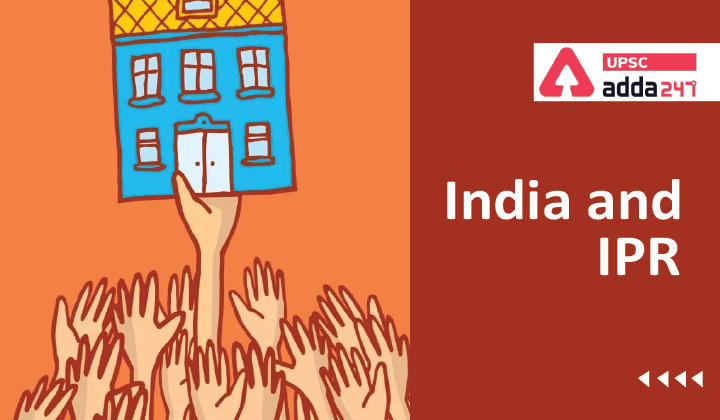Table of Contents
In our previous articles, we have discussed the basics of intellectual property rights (IPR) and TRIPS. In this article we will discuss about IPR in India. It will be the last article of this series. These 3 articles will help you solidify this topic and help you prepare well for UPSC IAS exam.
Get Free Study Material for UPSC and State PCS Examinations
IPR in India
- Under the Indian patent law, a patent can be obtained only for an invention which is new and useful.
- Also, the invention must relate to the machine, article or substance produced by a manufacturer, or the process of manufacture of an article.
- A patent may also be obtained for innovation of an article or of a process of manufacture.
- In respect to medicine or drug, no patent is granted for the substance itself even if it is new, however, the process of manufacturing and substance is patentable.
Patent laws in India: History
- The first step of the patent in India was Act VI of 1856.
- However, the history of patent law in India starts from 1911 when the Indian Patents and Designs Act, 1911 was enacted.
- The present Patents Act, 1970 came into force in the year 1972.
- This act amended and consolidated all the existing law relating to patents in India.
- The Patents Act, 1970 was again amended by the Patents (Amendment) Act, 2005, wherein product patent was extended to all fields of technology including food, drugs, chemicals and micro-organisms.
- The provisions relating to pre-grant and post-grant opposition have been also introduced.
- Again The Patents Act, 1970 was amended by the Patents (Amendment) Act, 2005 regarding extending product patents in all areas of technology including food, medicine, chemicals and microorganisms.
- In the Patents (Amendment) Act, 2005 provisions relating to exclusive marketing rights (EMR) have been repealed, and a provision has been introduced to enable the grant of compulsory licenses.
- Provisions related to pre-grant and anti-post protests have also been introduced.
The Patents Act, 1970:Term of patent in India
- The term of every patent in India is 20 years from the date of filing the patent application, irrespective of whether it is filed with provisional or complete specification.
Compulsory licensing
- Compulsory licensing is when a government allows someone else to produce a patented product or process without the consent of the patent owner or plans to use the patent-protected invention itself.
- It is one of the flexibilities given under TRIPS.
- Compulsory licensing is one of the most important aspects of Indian Patents Act, 1970.
- At any time after the expiration of three years from the date of the sealing of a patent, any person interested may make an application to the Controller of Patents for grant of compulsory license of the patent, subject to the fulfilment of certain conditions.
Ever greening of patent
- Ever-greening of patent right is a strategy adopted by the innovators having patent rights over products to renew them by bringing in some minor changes such as adding new mixtures or formulations.
- It is, generally, done when their patent is about to expire.
- A patent on the new form gives the innovator company a 20-year monopoly on the drug, by using this method.
- Section 3(d) of the Indian Patent Law restricts patents for already known drugs unless the new claims are superior in terms of efficacy while Section 3(b) bars patents for products that are against public interest and do not demonstrate enhanced efficacy over existing products.
Also Read:





 TSPSC Group 1 Question Paper 2024, Downl...
TSPSC Group 1 Question Paper 2024, Downl...
 TSPSC Group 1 Answer key 2024 Out, Downl...
TSPSC Group 1 Answer key 2024 Out, Downl...
 UPSC Prelims 2024 Question Paper, Downlo...
UPSC Prelims 2024 Question Paper, Downlo...







